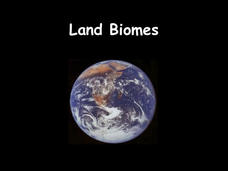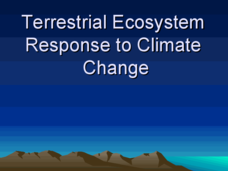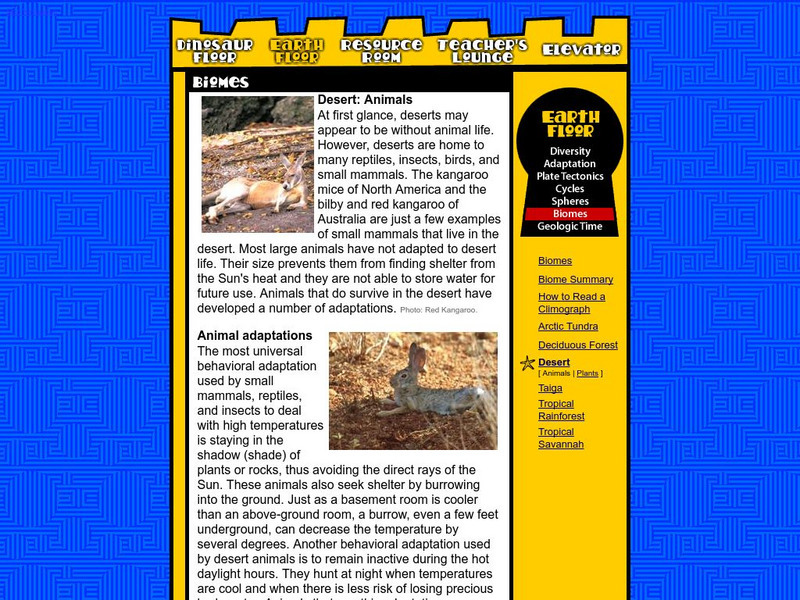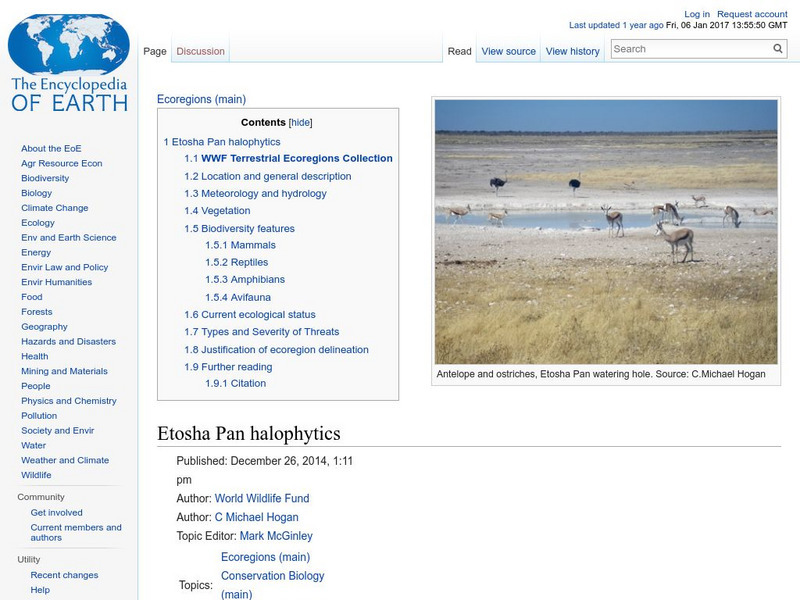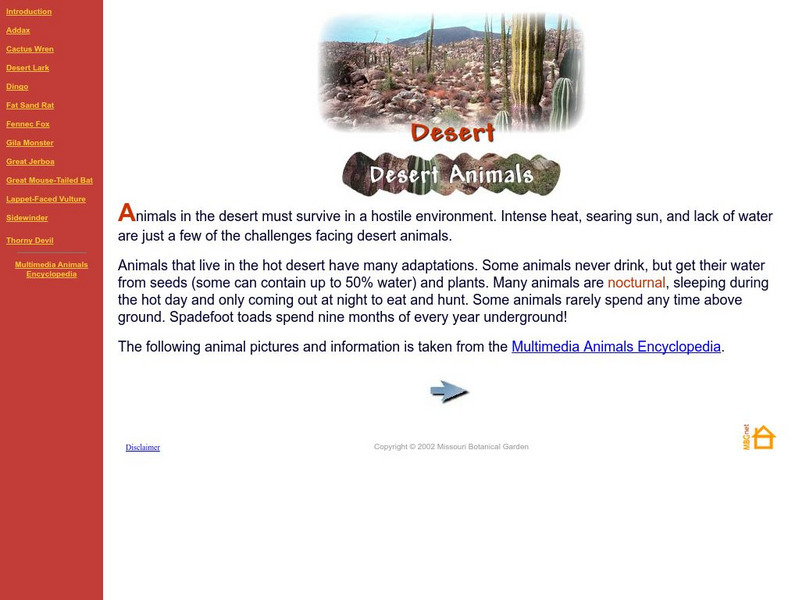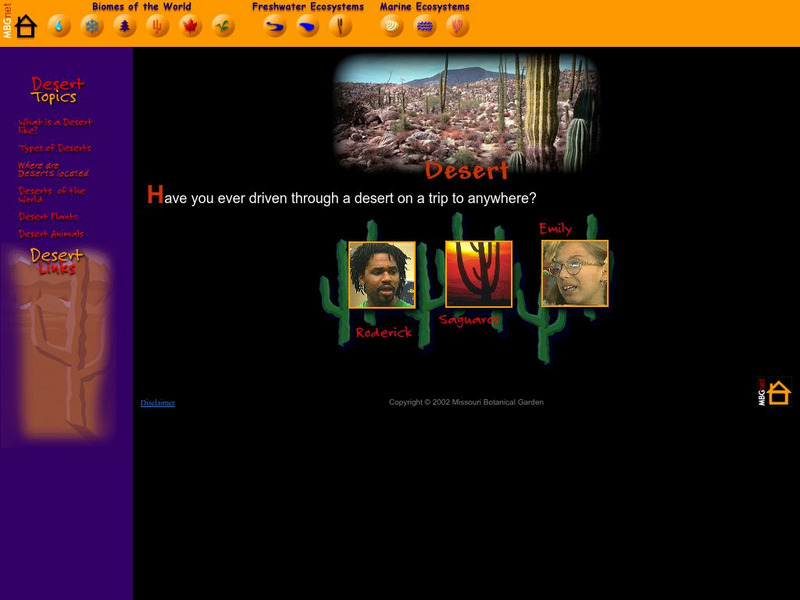Curated OER
Deserts
What is it like in the desert? Inform your class on what makes a desert, the type of climate they'll find there, and the interesting plant and animals that live in the desert environment. This is a text-rich presentation that will...
Curated OER
Biomes
Arranged as an interactive lesson, this presentation focuses on the six world biomes. Upcoming biologists click on a specific biome and a slide lists its location, description, native plants, and animals. A quiz provides learners with...
Biology Junction
Land Biomes
Biomes share similar climates and ecosystems, despite being separated geographically on the planet. A presentation introduces the six most common land biomes. It focuses on the commonalities in climate, plants, and animals with many...
Curated OER
Terrestrial Ecosystem Response to Climate Change
An extensive investigation of the Earth's climate changes awaits your environmental science classes. This top-notch presentation begins by looking at the history of Earth's climate and then predicts the impact on each major terrestrial...
Curated OER
Academic Raceway Ecosystems and Biomes
This ecology PowerPoint allows students to review the characteristics of each biome. There are real photographs to go along with each description of the specific biome. There is a vocabulary slide which also introduces key terms.
Curated OER
Habitats
Photographs of different habitats ask viewers to consider who would live in each. Desert, polar, rain forest, freshwater, and ocean habitats are depicted. Each is followed by a slide with pictures and color graphics of the inhabitants....
Curated OER
Ecology
Explore the rainforest with this fact building PowerPoint. With 11 slides filled with biome images, this would work well with a lecture about the different types of ecosystems. Pictures of the desert, rain forest, and forest are identified.
University of California
Ucmp: The Desert Biome
Learn about the four types of deserts: hot and dry, semiarid, coastal, and cold with this key facts and information. Includes links to other biomes: aquatic, forest, grasslands, and tundra.
Science Struck
Science Struck: Desert Biome: A Guide to Its Animals and Plants
Describes many of the plants and animals that live in deserts and their special adaptations that have enabled them to survive there. Also describes four types of deserts.
Other
Worldbiomes.com: Desert Biome
Directed toward elementary students, this site provides an overview of the desert biome. Included are the many kinds of deserts, links to related biome web sites, world map of biomes, and photographs of the desert biome.
Center for Educational Technologies
Earth Floor: Desert Biome: Animals
Site provides information on desert animals and animal adaptations. Offers links to desert plants and their adaptations, other biomes, and more.
Encyclopedia of Earth
Encyclopedia of Earth: Biomes: Great Victoria Desert
Describes the geography of the Great Victoria Desert in Australia, its biodiversity, conservation status, and the types of threats to its biodiversity that it faces.
Encyclopedia of Earth
Encyclopedia of Earth: Biomes: Etosha Pan Halophytics
Article on the Etosha Pan saline desert in Namibia, which is what remains of a lake from the Pliocene Epoch. Describes its geography, climate, plants and animals, its conservation status, and threats to its biodiversity. (Published:...
Missouri Botanical Garden
Missouri Botanical Garden: Animals of the Desert
Learn about different types of animals that live in the desert biome such as the cactus wren, the desert lark, the dingo, the fat sand rat, the fennec fox, the Gila monster, and so on. Animal pictures and information is taken from the...
University of California
Ucmp: The World's Biomes
This is an introduction to the major biomes on Earth. This page groups biomes into five major types: aquatic, deserts, forests, grasslands, and tundra. Information on climate, animal/plant life, and much more is given for each of type...
University of California
Ucmp: The World's Biomes
The University of California Museum of Paleontology hosts this site devoted to the study of the earth's biomes, which are the world's major communities, classified according to the predominant vegetation and adaptations of organisms to...
Palomar Community College District
Major Biomes of North America
A good review of basic terminology followed by descriptions and pictures of the North American biomes.
Missouri Botanical Garden
Missouri Botanical Garden: Plants of the Desert
The Evergreen Project reveals such desert plants as the dragon tree, the saguaro cactus, the prickly pear, the desert spoon, the aloe plant, and the like. Illustrated.
Science Struck
Science Struck: Facts About the Gobi Desert
Desertification is a growing problem in the world today and it is taking place in the Gobi Desert as well. Learn facts about the Gobi Desert, including its five ecoregions, the climate, and the flora and fauna.
Science Struck
Science Struck: Mojave Desert Animals and Plants
Describes characteristics and adaptations of plants and animals that are able to survive in the Mojave Desert and a list of each.
A-Z Animals
A Z Animals: Reference: Habitats: Desert
This entry identifies the defining characteristics of the desert.
Science Struck
Science Struck: Arabian Desert Facts
Presents interesting information about the Arabian Desert, including its physical geography, climate, plants and animals, their adaptations to the environment, natural resources, and threats to its habitats.
Science Struck
Science Struck: Limiting Factors in the Desert Ecosystem
Describes conditions in a desert that limit how large populations of species can grow.
Science Struck
Science Struck: Symbiotic Relationships in the Desert
Describes three types of symbiotic relationships that can be found in a desert biome.
Other popular searches
- Desert Biomes Texas
- Desert Biome Threats
- Desert Biome Model
- Desert Biomes Mobile
- Desert Biomes Songs
- Temperate Desert Biome
- World Desert Biomes
- Desert Biomes in Africa
- Research Units Desert Biomes
- Desert Biomes Unit Plan
- Desert Biomes Experiments
- Desert Biome Puzzles


